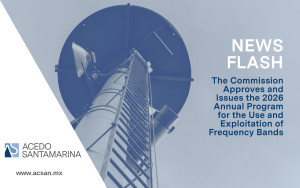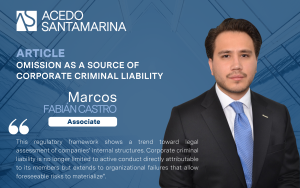
On December 11, 2018, an excerpt of the preliminary draft of the Technical Criteria of the Federal Economic Competition Commission for the handling of information derived from legal advice provided to economic agents (“Technical Criteria”) was published in the Official Gazette of the Federation.
The origin and reason for the aforementioned Technical Criteria arises from the importance of professional secrecy, which is a requirement that exists in certain professional activities, such as law, that demand total trust on the part of the individual with the service provider.
The Perugia Declaration of 1977 on deontological principles of the European Community Legal Profession emphasizes the importance of the respect and confidentiality that lawyers must maintain with their clients, and also points out that professional secrecy is thus an elementary right and duty of the profession, forming part of the pure essence of the legal profession, based on the unavoidable confidentiality between the client and the lawyer. Although it is advisable for lawyers to make a habit of inserting a confidentiality clause in their communications, such a clause is not necessary; the warning of “confidentiality” of the communication is understood per se.
In Mexico, the regulation of professional secrecy, as in the rest of the field concerning professional practice, is scarce and deficient. The highlights are scattered throughout the civil and criminal legislation. It is an imperfect rule that lacks sanction.
The purpose of these Technical Criteria is that the information obtained by the Federal Antitrust Commission (“the Commission”) will not be considered or obtain evidentiary value when such information is contained in communications intended to obtain legal advice.
The foregoing, between any person and his attorney, in which, in writing and in order with the Technical Criteria, it is stated that the information that has been provided or has been obtained by the Commission in a visit or investigation procedure, is susceptible to be protected (the “Request for Qualification”). In the event that the lawyer or the economic agent is unaware of these Technical Criteria, the public servant processing the investigation must proceed ex officio in accordance with the application of these Technical Criteria, informing the Director General
[1] Barney, O. C. (2018). El secreto profesional del abogado en México (1st ed.). Mexico: Universidad Nacional Autónoma de México, Instituto de Investigaciones Jurídicas, Ilustre y Nacional Colegio de Abogados de México.
[1] The Declarationof Perugia, 1977.
[1] Henrotte, Jean-Francois y Cassart, Alexandre, “Plaidoyer pour la prise en compte du secret professionnel de l’avocat dans la nouvelle Directive `réten- tion des données”, Union Internationale des Avocats, Juriste Internationale, París, núm. 3, 2014, p. 38.
in order to be conducted in accordance with the procedure for processing the Request for Qualification.
Once the Request for Qualification has been filed, the pertinent measures for safeguarding and protection will be taken, until such time as a decision is made as to whether the information is protected. The procedure for processing the Request for Qualification is as follows:
in order to be conducted in accordance with the procedure for processing the Request for Qualification.
Once the Request for Qualification has been filed, the pertinent measures for safeguarding and protection will be taken, until such time as a decision is made as to whether the information is protected. The procedure for processing the Request for Qualification is as follows:
I. Five days after the Request for Qualification has been received, the General Director in charge of the procedure shall forward it to the Head of the Unit;
II. Subsequently, within the following five days, the Head of the Investigating Authority will issue an agreement appointing the members of the Qualifying Committee, which is the only committee empowered to analyze the referred information.
Likewise, the Qualification Request will be ordered and the applicant will be personally notified;
III. The instructor, member of the Qualifying Committee will analyze the Request for Qualification and within the following ten days will issue an agreement in which: i) admits the Request for Qualification and convenes the Qualifying Committee so that, at an agreed time, the corresponding session is held, or ii) warns on a single occasion, when the document omits any formal requirement, a maximum term of five days shall be granted to correct it;
IV. Once the Request for Qualification has been analyzed, the Qualifying Committee, in a collegiate manner, will deliberate and decide whether the request is well-founded or unfounded.
In the event that it is declared well founded, the necessary safekeeping measures shall be ordered, if the information is physical, its return shall be ordered, if it is an electronic file, its exclusion shall be ordered and it shall be recorded in a record. Otherwise, it will be ordered to be forwarded to the General Directorate so that the information may be made available; and
V. Finally, the determination issued by the Qualifying Committee will be notified personally to the applicant.
It is important to mention that these Technical Criteria are preliminary drafts, therefore, a public consultation period is opened for thirty working days from the publication of these Technical Criteria, in order for any interested party to submit their opinions to the Commission. If approved, these Technical Criteria will become effective on the date of their publication in the Official Gazette of the Federation.
Sources consulted:
• Diario Oficial de la Federación. (2018, diciembre 11). EXTRACT of the preliminary draft of the Technical Criteria of the Federal Antitrust Commission for the handling of information derived from the legal advice provided to economic agents. From the web site: http://www.dof.gob.mx/nota_detalle.php?codigo=5546197&fecha=11/12/2018
• Barney, O. C. (2018). El secreto profesional del abogado en México (1st ed.). Mexico: Universidad Nacional Autónoma de México, Instituto de Investigaciones Jurídicas, Ilustre y Nacional Colegio de Abogados de México.




